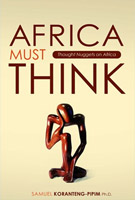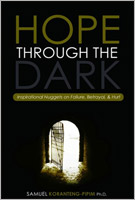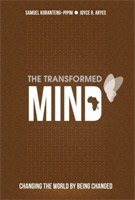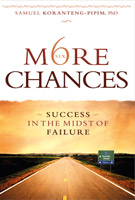Who Will Train the Next Generation?
A Report on Africa Arise Conference & AU's Prayer Breakfast for African Heads of State (January 24-30, 2017).
By Samuel Koranteng-Pipim, PhD
Just in case you miss the thrust of my report, this is what I want to say: “Success without a successor is failure. True leaders train others to succeed them; but great leaders develop others to supercede them.”
The above is a summary of the burden I shared in Addis Ababa, Ethiopia, where I was invited to the Africa Arise Conference and the African Union’s Prayer Breakfast for the African Heads of State (January 25-30, 2017). Now in its 9th year, the Africa Arise Network is a movement of African leaders who are committed to combatting Africa’s unique challenges from a Biblical perspective. The conference is a yearly event that is conducted by the “Africa Arise Network” alongside the annual African Heads of States Summit in Ethiopia.
I was one of the moderators to this year’s Africa Arise Conference conference, which focused on “Bridging the Generational Gap.” It ties in with this year’s theme for the African Union—which also focuses on youth (The fancy theme chosen by the AU is: “Harnessing the Demographic Dividend through Investments in Youth”). During my short presentation at the Africa Arise conference, I called attention to the ages of the current African Heads of state to compel a need to train and transition to a younger generation. Here are some facts (as at January 2017):
Isaias Afwerki - 70 (President of Eritrea since its independence in 1993)
Ismaïl Omar Guelleh - 70 (President of Djibouti since 1999)
Ibrahim Boubacar Keita - 71 (President of Mali since 2013)
Omar al-Bashir - 72 (President of Sudan since 1989)
Bethuel Pakalitha Mosisili - 72 (Prime Minister of Lesotho since March 2015; He previously served as Prime Minister from 1998-2012)
Yoweri Kaguta Museveni – 72 (President of Uganda since 1986)
Nana Addo Dankwa Akufo-Addo – 72 (President of Ghana since January 2017; had run for President two previous times)
Denis Sassou Nguesso – 73 (President of Congo since 1997)
Muhammadu Buhari – 73 (President of Nigeria since 2015; previously served as Head of State from 1983-1985)
Jacob G. Zuma – 74 (President of South Africa since 2009)
Jose Eduardo dos Santos – 74 (President of Angola since 1979)
Teodoro Obiang Nguema Mbasogo – 74 President of Equatorial Guinea since 1979)
Alassane Ouattara – 75 (President of Cote d’Ivoire since 2010)
Hage Geingob – 75 (President of Namibia 2015)
Peter Mutharika – 76 (President of Malawi since 2014)
Alpha Condé – 78 (President of Guinea since 2010)
Ellen Johnson Sirleaf – 78 (President of Liberia since 2006)
Abselaziz Bouteflika – 79 (President of Algeria since 1999)
**Hifikepunye Pohamba – 81 (Was President of Namibia 2005 to 2015)
Paul Biya – 83 (President of Cameroon since 1982)
Beji Caid Essebsi – 90 (President of Tunisia since 2014)
Robert Mugabe – 92 (President of Zimbabwe since 1980); will be 93 in February 2017
Talk about African Heads of State who, as at January 2017, have chosen “Harnessing the Demographic Dividend through Investments in Youth” as the theme for the 28th AU Summit (January 22-31, 2017). Is it an irony or a hopeful sign?
I can almost guarantee that what obtains in society (government or politics) also obtains in our churches and Christian institutions—both in Africa and other parts of the world. Please, please, don’t give me a lecture. I am aware of the Bible text that says, “The glory of young men is their strength, and the splendor of old men is their gray head” (Proverbs 20:29).
Yes, we respect “gray hairs”—the wisdom and experience of old age. But who will train the next generation.
If we are to get the Africa we want, we must start developing the Africans who can make the Africa we want. That means we must develop a new breed of Africans with a new mindset. Not just any kind of youth, but youth with transformed minds. Such are the ones we must train and empower to be leaders. Transformational leadership training and development. This is what our EAGLESonline organization is all about (www.EAGLESonline.org). And it is this burden that inspired the thought-nugget I wrote almost five years ago:
AFRICA HAS GREAT LEADERS
Only the ignorant and prejudiced will question the fact that Africa has produced some great leaders in its history. Today, however, it is highly debatable, to argue that Africa still has such great leaders—leaders who display excellence, humility and selfless service, and who inspire others to become effective future leaders. A majority of our “great leaders” today—in both society and church—want to be leaders for life. They stay in power till they become senile, or are chased out of power, or are shot dead by someone. Thus, they will make sure that until they die, no one else will ever come up to positions of prominence. Success without a successor is failure. True leaders train others to succeed them; but great leaders develop others to supercede them.—Samuel Koranteng-Pipim
[NOTE: The above nugget was excerpted from the full version at: http://eaglesonline.org/africa-has-great-leaders/]
I speak also to our churches and church institutions also—both in Africa and other parts of the world. “Success without a successor is failure. True leaders train others to succeed them; but great leaders develop others to supercede them.” E.G. White wrote:
“The standard-bearers are falling, and the young men must be prepared to take the places left vacant, that the message may still be proclaimed…” (Gospel Workers, p. 104.2)
“…There is no other class that can do as much good as young men and young women who are consecrated to God. The youth, if right, could sway a mighty influence. Preachers, or laymen advanced in years, cannot have one half the influence upon the young that the youth, devoted to God, can have upon their associates.” (Testimonies for the Church, Volume 1, p. 511.)
For more, check my full piece titled “Africa Has Great Leaders”: http://eaglesonline.org/africa-has-great-leaders/
—Samuel Koranteng-Pipim, PhD
February 9, 2017









